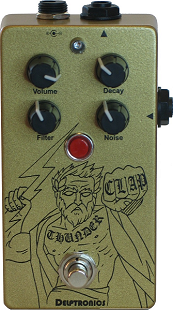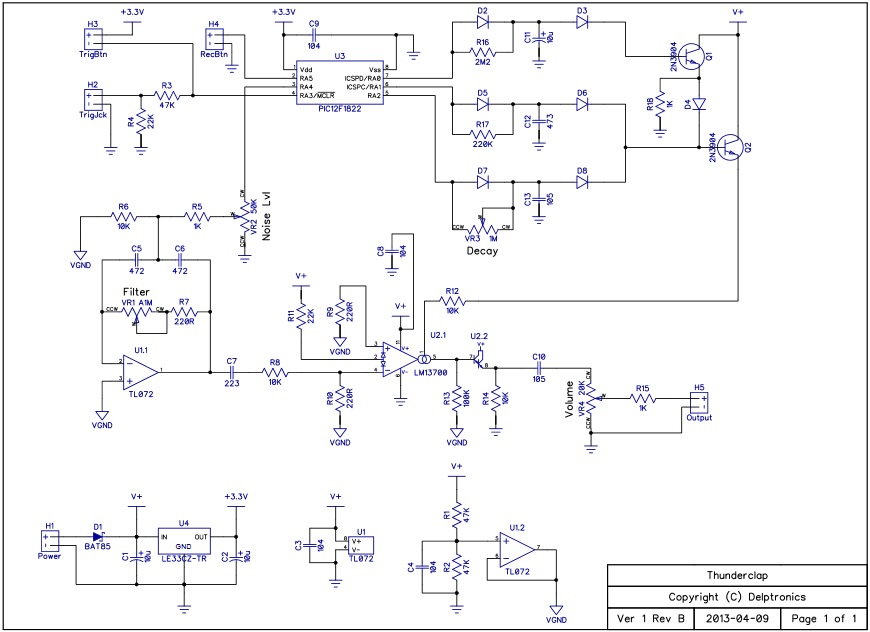Difference between revisions of "Thunderclap"
(→Phase Inversion: No) |
m |
||
| (5 intermediate revisions by the same user not shown) | |||
| Line 3: | Line 3: | ||
|} | |} | ||
[[Delptronics]] Thunderclap pedal was designed to make the Roland TR-808 "hand clap" sound. However, playing with the controls will enable a myriad of different kinds of sounds, varying from the 808-handclap to a fingersnap to a snare drum whose rattle is far too loose. | [[Delptronics]] Thunderclap pedal was designed to make the Roland TR-808 "hand clap" sound. However, playing with the controls will enable a myriad of different kinds of sounds, varying from the 808-handclap to a fingersnap to a snare drum whose rattle is far too loose. | ||
| + | |||
| + | |||
| + | ; Thermionic Studios has one(1) Thunderclap pedal that will be available for rental upon completion. | ||
==Controls== | ==Controls== | ||
| Line 9: | Line 12: | ||
* Knob 1 - '''"Volume"''': Adjusts the volume of the Thunderclap with the effect becoming more pronounced as the knob is turned clockwise. | * Knob 1 - '''"Volume"''': Adjusts the volume of the Thunderclap with the effect becoming more pronounced as the knob is turned clockwise. | ||
* Knob 2 - '''"Filter"''': Changes the timbre (tonal frequency) of the effect. Turning the knob clockwise tunes the effect to low frequencies, counter-clockwise moves the timbre into the higher frequencies. | * Knob 2 - '''"Filter"''': Changes the timbre (tonal frequency) of the effect. Turning the knob clockwise tunes the effect to low frequencies, counter-clockwise moves the timbre into the higher frequencies. | ||
| − | * Knob 3 - '''"Decay"''': Adjusts the "white noise" that is | + | * Knob 3 - '''"Decay"''': Adjusts the "white noise" that is heard in the tail of the sound generated. The knob turned fully counter-clockwise could be described as the sound of a note-attack, or "fingersnap" and nothing more. Fully counter-clockwise extends the sound tail (or the "decay") and can get you to the "overly-ratty" snare drum described above. |
* Knob 4 - '''"Noise"''': This knob adjusts the volume level of the '''Decay''' control. Turning the knob clockwise increases the emphasis of the decay | * Knob 4 - '''"Noise"''': This knob adjusts the volume level of the '''Decay''' control. Turning the knob clockwise increases the emphasis of the decay | ||
* Button 1 - '''"Record"''': Provides a brief looping facility, allowing the trigger button to play more than one discrete "clap" when pressed. | * Button 1 - '''"Record"''': Provides a brief looping facility, allowing the trigger button to play more than one discrete "clap" when pressed. | ||
| Line 15: | Line 18: | ||
===Jacks=== | ===Jacks=== | ||
| − | * Jack 1 - '''"Trigger In"''': It's possible to use another source to trigger the Thunderclap. Use this jack to plug in that | + | * Jack 1 - '''"Trigger In"''': It's possible to use another source to trigger the Thunderclap. Use this jack to plug in that alternate source. |
* Jack 2 - '''"Out"''': This is simply the "signal out", in the same way that the output jack on your instrument is an "out" without a corresponding "in". | * Jack 2 - '''"Out"''': This is simply the "signal out", in the same way that the output jack on your instrument is an "out" without a corresponding "in". | ||
* Jack 3 - '''"Power"''': A standard Boss-style tip-negative 9-volt AC adapter plugs in here. | * Jack 3 - '''"Power"''': A standard Boss-style tip-negative 9-volt AC adapter plugs in here. | ||
==Bypass: True== | ==Bypass: True== | ||
| − | The Thunderclap is, like any other electrified musical instrument, a signal generator, not a true "effect pedal". So the question of whether or not the pedal is "true bypass" is not | + | The Thunderclap is, like any other electrified musical instrument, a signal generator, not a true "effect pedal". So the question of whether or not the pedal is "true bypass" is not terribly meaningful. |
==General Information== | ==General Information== | ||
The Thunderclap effect is offered to customers in two forms: | The Thunderclap effect is offered to customers in two forms: | ||
| − | # The pedal shown | + | # The pedal shown here, and |
# A Euro-rack configuration, capable of being slipped into a spare synthesizer bank. | # A Euro-rack configuration, capable of being slipped into a spare synthesizer bank. | ||
* https://www.delptronics.com/thunderclap.php | * https://www.delptronics.com/thunderclap.php | ||
| Line 37: | Line 40: | ||
==Phase Inversion: N/A== | ==Phase Inversion: N/A== | ||
As in the case with Thunderclap being true bypass, the Thunderclap also causes no phase inversion because it is not a typical effect pedal. | As in the case with Thunderclap being true bypass, the Thunderclap also causes no phase inversion because it is not a typical effect pedal. | ||
| − | + | Like a musical instrument, the Thunderclap doesn't modify an existing signal, it creates a new one. | |
| − | |||
This makes the question of phase inversion "not applicable". | This makes the question of phase inversion "not applicable". | ||
Latest revision as of 16:51, 19 November 2020
Delptronics Thunderclap pedal was designed to make the Roland TR-808 "hand clap" sound. However, playing with the controls will enable a myriad of different kinds of sounds, varying from the 808-handclap to a fingersnap to a snare drum whose rattle is far too loose.
- Thermionic Studios has one(1) Thunderclap pedal that will be available for rental upon completion.
Controls

- Knob 1 - "Volume": Adjusts the volume of the Thunderclap with the effect becoming more pronounced as the knob is turned clockwise.
- Knob 2 - "Filter": Changes the timbre (tonal frequency) of the effect. Turning the knob clockwise tunes the effect to low frequencies, counter-clockwise moves the timbre into the higher frequencies.
- Knob 3 - "Decay": Adjusts the "white noise" that is heard in the tail of the sound generated. The knob turned fully counter-clockwise could be described as the sound of a note-attack, or "fingersnap" and nothing more. Fully counter-clockwise extends the sound tail (or the "decay") and can get you to the "overly-ratty" snare drum described above.
- Knob 4 - "Noise": This knob adjusts the volume level of the Decay control. Turning the knob clockwise increases the emphasis of the decay
- Button 1 - "Record": Provides a brief looping facility, allowing the trigger button to play more than one discrete "clap" when pressed.
- Footswitch 1 - "Trigger": Depressing the switch is a trigger which fires off the adjusted handclap sound, or a recorded sequence of such sounds.
Jacks
- Jack 1 - "Trigger In": It's possible to use another source to trigger the Thunderclap. Use this jack to plug in that alternate source.
- Jack 2 - "Out": This is simply the "signal out", in the same way that the output jack on your instrument is an "out" without a corresponding "in".
- Jack 3 - "Power": A standard Boss-style tip-negative 9-volt AC adapter plugs in here.
Bypass: True
The Thunderclap is, like any other electrified musical instrument, a signal generator, not a true "effect pedal". So the question of whether or not the pedal is "true bypass" is not terribly meaningful.
General Information
The Thunderclap effect is offered to customers in two forms:
- The pedal shown here, and
- A Euro-rack configuration, capable of being slipped into a spare synthesizer bank.
Pedal Manual
Delptronics hasn't released a user's or owner's manual. The closest offering possible is the build guide. We believe this wiki page is likely the closest resource to an owner's manual that can be found.
Delptronics does offer an assembly guide for the Thunderclap:
Phase Inversion: N/A
As in the case with Thunderclap being true bypass, the Thunderclap also causes no phase inversion because it is not a typical effect pedal. Like a musical instrument, the Thunderclap doesn't modify an existing signal, it creates a new one.
This makes the question of phase inversion "not applicable".
Schematic
Artists
We are currently unaware of any artists actively using the pedal now, or who have in the past.
- Additional Sources
